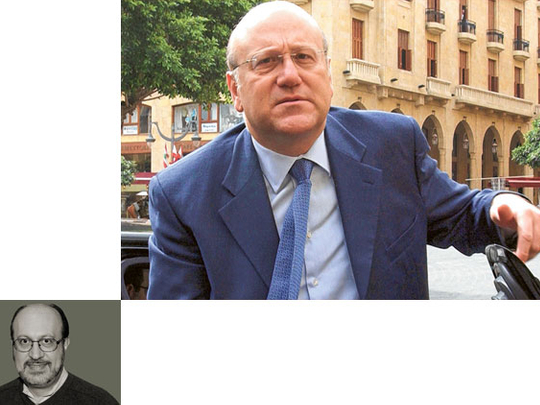
On 6 June 2008, and after months of waiting for the election of an inheritor to Emile Lahoud, then French president Nicolas Sarkozy spared five precious hours to visit Beirut and, in the process, became the first western leader to congratulate the country’s newly elected head of state, General Michel Suleiman. The hyperactive Sarkozy never returned, ostensibly because he was either excessively busy or, more likely, Lebanon did not deserve a second stop during his five years in office.
Sarkozy’s successor, President François Hollande alloted three precious hours last Sunday, when he guided his presidential Airbus to refuel at Rafik Hariri International Airport on his way to Jeddah.
At the Baabda Palace, Hollande pledged to protect Lebanon from blatant coercion and destabilisation, apparently caused by the deadly Syrian conflict that threatened to spillover. His pointed comments, which emphasised that France would “spare no effort[s] to guarantee Lebanon’s independence, unity and security,” along with his sharp words that “there can be no impunity” for the assassination of former prime minister Rafik Hariri along with the country’s top intelligence officer Wissam Al Hassan, displeased many.
It drew the ire of Nabil Nicolas, a member of Parliament from General Michel Aoun’s Free Patriotic Movement, who did not mince his words when he opined that Hollande was “not really informed about the situation in Lebanon,” asserting that the French Head of State “came to have some Lebanese coffee, and insulted Lebanese martyrs [when] he limited them to Hariri and AlHassan.” Nicolas held world powers responsible for the revolution in Syria, insisting that Washington, London and Paris allegedly “incited the Syrian people” to revolt, which was both incorrect and gratuitous.
For his part, and even before Hollande landed in Beirut, the head of Hezbollah’s executive council, Sayyid Hashem Safi Al Deen confirmed that the current government would survive under Prime Minister Najeeb Mikati. “When [opposition leaders within the March 14 Movement] raised their voices to overthrow the Cabinet,” he insisted, these parties failed to note that “it was achieving very important tasks.” He predicted that Mikati would survive even if odds were stacked against him.
In the event, Hollande told reporters flying with him from Beirut to Jeddah that the “visit to Saudi Arabia [was] primarily political” and that he intended to discuss with King Abdullah Bin Abdul Aziz conditions in Lebanon, the revolution in Syria, as well as epochal developments in Iran.
“France plays an active role in the Middle East,” he affirmed, as he clarified that Paris assumed key responsibilities with respect to Syria and Lebanon on the global political checkerboard. Inasmuch as Paris and Riyadh shared near identical views on the nearly 20-months old conflict in Syria, it was critical to note that former Lebanese prime minister Sa’ad Hariri was present during the Hollande audience. Above all else, this highlighted that France and Saudi Arabia may well have reached an agreement to indefinitely exclude Prime Minister Mikati from any future developments in Lebanon. “We absolutely don’t accept Mikati,” Hollande was quoted as telling Abdullah in the meeting.
Consequently, it was fair to state that the Hollande meeting with his Lebanese counterpart, as well as his talks with King Abdullah in Hariri’s presence, were clear messages telegraphed to all concerned. By all accounts, the French official seemed anxious to see a significant political change in Beirut, something that King Abdullah wholeheartedly approved of.
Reportedly, the two leaders also discussed the controversial Iranian nuclear programme, a top item on the Frenchman’s agenda, as Paris announced that it intended to back additional sanctions against the Islamic Republic if no “concrete acts” were displayed by Tehran to prove that it was not pursuing a nuclear arms drive. Naturally, and despite Iranian denials that it intended to build an atomic bomb, Saudi Arabia was deeply concerned with nuclear proliferation, which may yet force its own hands to embark on a costly and dangerous arms race.
Unfortunately, Hollande’s Lebanon and Saudi Arabia visits were far too short, as he was headed for an Asia-Europe summit in Laos. Although he promised to return because Hollande felt that he was “in a friendly country” and while history will record that his first visit to the Middle East began in Lebanon, the brief call highlighted how peripheral the country was for a permanent member of the United Nations Security Council. Even Saudi Arabia, a G-20 member with immense potential, represented no more than a pithy stop.
At a time when the international community needed meaningful exchanges and measured pronouncements, it behooved major powers to reinvent their business models. To be sure, no one expected global treks to produce lasting policies or result in immediate contracts that required months and years to negotiate. Rather, leaders of Hollande’s stature ought not repeat the Sarkozy errors, which illustrated indifference that damaged ties. Lebanon and Saudi Arabia were key Arab countries each within its own environment, and it was critical to elevate the tone of the conversation to a higher plane, lest one fall back to e-mail exchanges. Time will tell whether Hollande’s successor five years hence will schedule an hour-long refueling stop in Beirut or enough time to eat lunch at the Jeddah Royal Palace.
Dr Joseph A. Kéchichian is the author of the forthcoming Legal and Political Reforms in Saudi Arabia.








